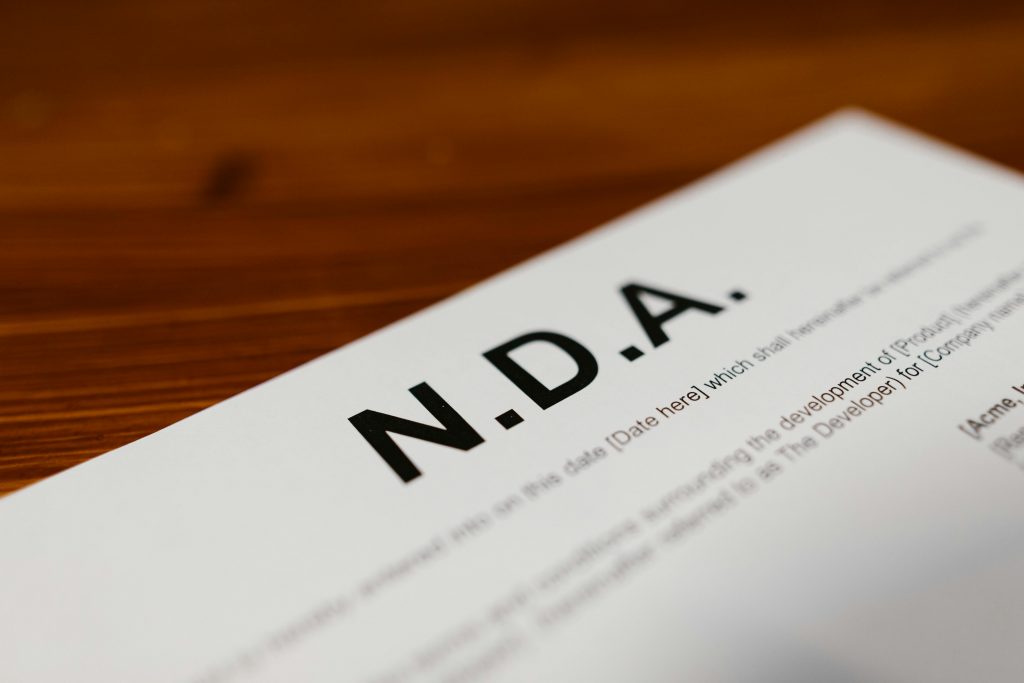Navigating Confidentiality: How a Professional Ghostwriter Handles Sensitive Information
October 18, 2024
Trust is a crucial element in the ghostwriter-client relationship. Clients need to feel confident sharing intimate and often confidential material with their writer.
Whether the project involves stories for a family history book or sensitive information for a corporate initiative, ghostwriting assignments frequently contain delicate content. Upholding confidentiality regarding this sensitive material is essential for maintaining the client’s trust and successfully completing the project.
Confidence in the Ghostwriter-Client Relationship
Confidentiality lies at the core of a productive ghostwriting relationship.
At the end of the day, a ghostwriter — whether they work for a high-powered corporation or as an independent freelancer — recognizes that the confidentiality of their services is not a mere courtesy; it is essential to a fair and balanced relationship with the client. This, in turn, allows the ghost to provide a service that earns the client’s trust by producing a product that is conceived and executed by the client alone, without sacrificing privacy.
Legal Agreements: Non-Disclosure Agreements (NDAs)
Ghostwriters employ several methods to protect client confidentiality, starting with a legally binding contract, typically a Non-Disclosure Agreement (NDA). This agreement safeguards both parties by ensuring that any information the client shares—be it a secret, a story, or a manuscript—remains confidential.

Without an NDA, a ghostwriter is not legally obligated to maintain confidentiality.
The NDA provides a legal framework for handling sensitive information, whether it’s family documents for a history book or proprietary business data for a corporate project.
It binds the ghostwriter to a commitment not to disclose any of the information for purposes outside the project, ensuring that the client’s details are kept private.
Key Components of an NDA:
- Confidentiality Clause: This outlines precisely what information must be kept confidential and how it will be managed.
- Length of Confidentiality: NDAs usually have a specified duration, often extending beyond the completion of the project.
- Usage Rights: The agreement details what the ghostwriter can and cannot do with the client’s information (e.g., using it solely for the purpose of writing the book).
- Penalties for Breach: The NDA includes legal repercussions for any breach of confidentiality, emphasizing the seriousness of the agreement.
The relationship is formalized when the client and ghostwriter sign the NDA. This protects sensitive information and provides legal recourse if confidential details are disclosed later. With this arrangement, clients can trust their ghostwriter with personal information, knowing there are mechanisms in place to address any potential breaches.
It’s essential for ghostwriters to encourage clients to establish an NDA before starting a project. This helps clients feel secure in sharing deeply personal details, which is especially crucial for those writing memoirs or family history books.
How Ghostwriters Manage Sensitive Information
Maintaining the security of sensitive material is a critical component of every ghostwriting project. Ghostwriters not only sign NDAs but also adhere to established policies and procedures to ensure that any material shared with them—be it deeply personal stories or confidential business information—remains secure throughout the entire process.
Best Practices for Handling Sensitive Data
- Secure Storage: Professional ghostwriters prioritize confidentiality. Sensitive files are encrypted and password-protected for digital documents, while hardcopy materials are stored in secure, locked locations with controlled access.
- Encrypted Email: Many ghostwriters utilize encrypted email services or secure messaging for sharing drafts or personal information. This ensures that all communications between the client and ghostwriter are shielded from third-party interception, allowing clients—whether working on a family history book or a corporate project—to feel confident that their private stories remain confidential, even online.
- Minimal Access: Another best practice is to restrict access to privileged material to only the ghostwriter and the client. If a project requires additional team members, such as an editor or designer, their access is limited strictly to what is necessary for their work, with clear guidelines on how the information can be used.
- Handling Physical Documents: Ghostwriters must handle physical documents—such as old letters, photographs, or legal papers—with care. Whether they are fragile originals or copies, these items should be stored securely and, if possible, digitized to minimize the risk of damage or loss. This is especially crucial for projects like family history books, where such documents may be irreplaceable.
Client Anonymity and Privacy Concerns
Ghostwriters are often engaged for projects where clients wish to remain anonymous or keep certain aspects of their identity private.
Whether the client is a celebrity writing a memoir, a business executive sharing confidential insights, or someone who simply prefers to stay out of the spotlight, ghostwriting services are committed to respecting client privacy throughout the entire process.

For both personal and professional reasons, many clients request that ghostwriters remain anonymous.
Regardless of whether the project involves a book or other content, ghostwriters employ various techniques to safeguard their clients’ identities.
These methods can include using pseudonyms, removing identifying information from drafts, and ensuring that no public-facing material, such as marketing content, is shared without the client’s explicit consent.
Ghostwriters can remain completely invisible if that’s the client’s preference.
Even when the client’s work is intended for public consumption—such as a memoir or corporate publication—ghostwriters are especially attuned to privacy concerns.
Clients may ask for specific names, locations, or events to be altered or omitted to protect their identities or those of others. Ghostwriters collaborate closely with clients to implement these changes, ensuring that the story’s integrity is preserved while addressing privacy needs.
Handling Ethical Dilemmas with Sensitive Information
In some instances, ghostwriters may encounter sensitive or controversial information that raises ethical dilemmas. How should they handle confidential details that could conflict with professional standards of honesty and responsibility?
Ghostwriters must be equipped to navigate these challenges while balancing truthfulness with respect for privacy.
Clients often share deeply personal or contentious stories, such as family secrets or business dealings that could have significant consequences. Ghostwriters need to approach these narratives with caution, ensuring that they frame the stories in a way that respects all parties involved while adhering to ethical standards.
For example, projects that expose sensitive family dynamics may require careful wording to avoid causing harm or violating anyone’s privacy.
In such cases, a ghostwriter may advise the client on the potential repercussions of disclosing certain information, facilitating an open dialogue about the implications of including sensitive material in the final product. This conversation might address legal liability or the risk of causing distress to others.
Maintaining Confidentiality When Facing Ethical Challenges
Maintaining confidentiality is particularly important when clients wish to address controversial policies or personal decisions. They may want to share their perspectives without divulging too much about their private lives.

Ghostwriters are bound by confidentiality agreements, such as NDAs, which ensure that everything the client shares remains private.
Regardless of how sensitive or controversial the material may be, the ghostwriter will not disclose it outside of the professional relationship without the client’s explicit consent.
The ghostwriter aims to strike a balance between truth and sensitivity while honoring the client’s wishes.
By prioritizing confidentiality and professionally addressing ethical concerns, ghostwriters produce work that reflects the client’s vision while upholding high ethical standards.
Building Trust Through Transparency
Trust is essential for a successful ghostwriting relationship, and transparency is a key element in establishing that trust.
A skilled ghostwriter will be open from the very first consultation, ensuring that the client understands not only the writing process and timeline but also how their sensitive information will be safeguarded. This openness lays the groundwork for trust, making it easier for clients to share personal or proprietary details.
Transparency in Handling Sensitive Information
Clients often have concerns about how their ghostwriter will manage personal or confidential information.
A good ghostwriter will clearly outline the measures taken to protect that information, such as secure storage, encryption, and limited access. By explaining these security protocols, the ghostwriter helps alleviate any worries the client may have.
For particularly sensitive topics—like a client’s family history with controversial elements or a company’s strategic business plans—it’s crucial for ghostwriters to clarify how this material will be treated. Providing early drafts or sample chapters for review ensures that the client is comfortable with the presentation of their story before moving forward.
Regular Updates and Opportunities for Feedback
Ongoing communication is vital during the writing process. Ghostwriters keep clients informed with regular status updates, drafts, and outlines for feedback, ensuring that clients feel engaged and heard.

A professional ghostwriter will actively seek the client’s input to make sure the final product reflects their voice and objectives.
For instance, if a ghostwriter is working on a memoir, the client might want to review each completed chapter to confirm that it aligns with their vision.
This collaborative approach allows for adjustments, ensuring that the final product stays true to the client’s story and goals.
Addressing Concerns Early
Another critical aspect of transparency is addressing any concerns or questions at the outset of the project. If a client is uncertain about how their privacy will be maintained or worried about how sensitive details will be handled, a good ghostwriter will tackle these issues directly. This open dialogue fosters trust and helps the client feel comfortable and confident throughout the project.
By establishing trust through transparent communication, ghostwriters create a collaborative environment where clients can share their stories, knowing their privacy and creative vision are respected.
Protecting Your Story with a Professional Ghostwriter
When telling your story—whether through a family history book, memoir, or corporate project—confidentiality and trust are crucial for a smooth process and an authentic final product. Ghostwriters understand the sensitive nature of the information they handle and prioritize client privacy every step of the way, from signing NDAs to implementing secure data management practices.

For clients who value control over their personal or proprietary details, working with a ghostwriter provides peace of mind that their story will remain confidential while being transformed into a polished, professional narrative.
The careful handling of sensitive information, protection of client anonymity, and transparency throughout the process foster a comfortable, collaborative partnership that results in meaningful, well-crafted work.
Whether you opt for a DIY approach or decide to hire a ghostwriter, understanding how sensitive information is managed can help you make informed decisions about protecting your personal story or business secrets. If privacy, customization, and professionalism are your top priorities, ghostwriting services offer the ideal solution for creating a beautifully written, confidential project that honors your unique voice and story.































